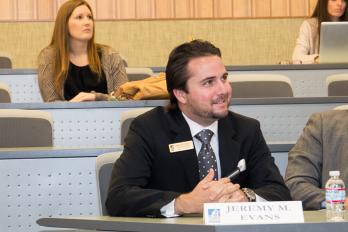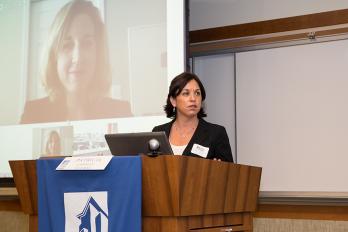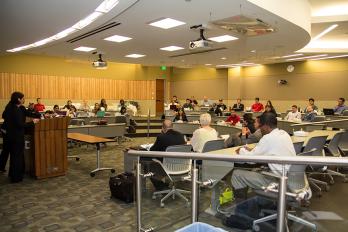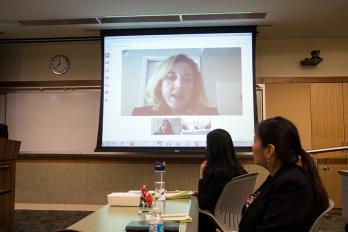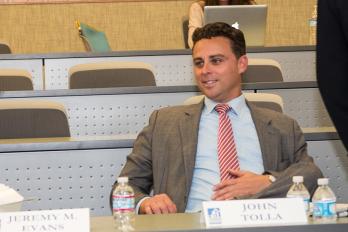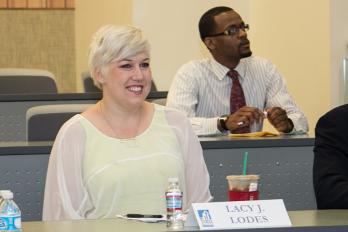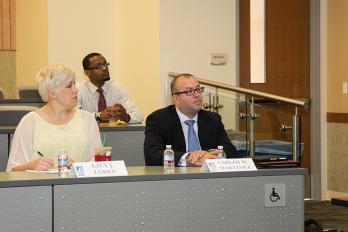Alternative Careers Panel
April 25, 2013
By Stephanie Marquez
Development and Alumni Relations Coordinator
In an effort to offer insight into other avenues besides the general direction after law school, students and panelists gathered for the Alternative Careers Panel discussion on Wednesday, April 24, presented by the Alumni Association and moderated by P. Camille Guerra ’04, Attorney, Casey Gerry Schenk Francavilla Blatt & Penfield LLP.
Panelists included TJSL alumni Jeremy Evans ’11, Managing Attorney/Owner, CSLlegal; John Tolla ’06, Associate, Booz|Allen|Hamilton; Lacy J Lodes ’08, Consultant/Attorney, LacyJLaw, Cryptozoic Entertainment; Carlos M. Martinez ’09, Attorney, Law Office of Carlos M. Martinez; and Christie Edwards ’07, Human Rights Advocate, Vital Voices.
Christie Edwards ‘07 joined the discussion via Google + from Washington, D.C. Edwards discussed her interest in and experience with international law, human rights, and work in nonprofits. She advised students to “Do as many internships while in school, everyone starts out as an intern, and that is okay.” Edwards volunteered with several nonprofits while at TJSL and says that the skills she gained as an intern were invaluable. She emphasized not only how important having a legal background is but how important budgeting and program management skills are.
Jeremy Evans ’11 said he grew up loving baseball and has always had a passion for sports. If he didn’t have the talent to play professional sports, he thought, he would definitely want to represent athletes in some capacity. Evans explained that being a sports agent only requires a bachelor’s degree. “Law students and graduates need to see that you do not need a license to succeed,” said Evans. “The bar license can assist and grow your business, whatever that may be, but it is not essential. Having or not having a bar license is dependent on whether you want to practice law, will need the license, and whether you want to be in the courtroom,” said Evans. A student later brought up the question of whether a license would even be needed at all if it isn’t always necessary to have one; this sparked a conversation with the panelists on how effective and powerful having a license can be, especially with getting your foot in the door, even if it is not always used to practice law. “Hopefully law students got out of the panel that you can succeed in many areas of business and the law. The law degree is an access point to success, it is up to the individual whether they are successful,” said Evans.
Carlos M. Martinez ’09 highlighted how important it is to keep all three of his businesses separate, and though at times he may not be wearing his attorney hat, but instead wearing several others, having your license is always going to be extra beneficial. “You want credibility, your license gives you instant credibility,” said Martinez.
Lacy J Lodes ’08 works with athletes and celebrity clients and assists them in taking their names into a product line. She offered the point of a global perspective since she works with clients with affiliations in more than 36 counties. Having a legal background is so advantageous to all the work that she does. “My goal in participating in the panel discussion was to dispel the notice that non-litigation jobs are “alternative” legal careers,” said Lodes. “That is silly. What may be alternative about my career is the way I manage my practice, my global reach, my niche field, but nothing about it is an ‘alternative’ to a legal practice.”
John Tolla ’06 offered his perspective on how to market yourself, whether that be as an attorney, a legal consultant, a legal professional or anything else. “Clients have different needs, consequently their representation may be in many different forms,” said Tolla.“You have to solve problems in life. Deconstruct the major problems people have and reconstruct them with solutions. My participation sought to bring emancipation to those facing imagined incarceration,” said Tolla. “I think law students are too tethered to some illusory competition for grades, jobs, money, etc. What they really should focus on is culturing a set of elite talents, such as critical reasoning. To that end, students should keep a strong focus on legal thinking skills – i.e. the ability to identify and isolate relevant facts – and seek to deconstruct problems, uncover their root causes, and reconstruct solutions for sale at a profit. That, to me, seems to be the essence of a successful practitioner in any field, alternative or otherwise.”
“There’s a good community here, it is your job to keep it strong, it’s all about shepherding,” Lodes said. “Your job with a license is to go find something to do. Take pride in your school. It takes going in for a job and not apologizing for where you graduated from but having that confidence and pride that makes a difference.”
The three primary themes from this discussion were what the value of being licensed to practice truly means, the global perspective that many attorneys in traditional and contemporary fields face and the idea of a thought provoking fear some students may have about not finding employment after graduation. All of which were fascinating topics that sparked a stimulating discussion amongst the panelists and audience. Many students were able to ask more specific questions after the discussion ended.
